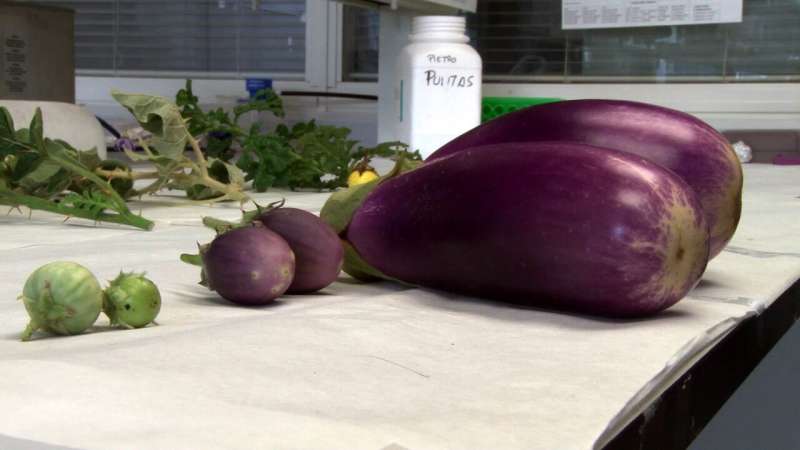New eggplant varieties resistant to extreme conditions

The Universitat Politècnica de València (UPV), through the Institute of Conservation and Improvement of Valencian Agrodiversity (COMAV), leads EggPreBreed II, an international project that will help in developing new varieties of eggplants more resistant to extreme drought conditions, and to two of the most serious pathologies that affect this crop, such as the Fusarium fungus and nematodes. These phytopathological enemies of eggplant can cause significant crop losses and their incidence is expected to be even greater due to climate change.
Eggplant is one of the thirty-five crops considered as most important for world food security and, as such, is included in Annex 1 of the FAO International Treaty on Plant Genetic Resources for Food and Agriculture (ITPGRFA).
The EggPreBreed II project will help to develop new varieties of this crop with better properties. For this, the COMAV team works in new crosses of eggplants grown with related wild species such as, for example, Solanum incanum and Solanum elaeagnifolium, which have a high resistance to drought. With these crosses EggPreBreed II will allow to obtain genetic material of eggplant that in most of its characters—fruit size, color, composition, etc. - is indistinguishable from a presently cultivated eggplant, but they have fragments of the wild species genome that can confer properties of great value to the market.
"By introducing genes from these wild species we can improve drought tolerance, get higher eggplant production with the same amount of water. But, in addition, we can also take advantage of other characteristics of interest of wild species, for example, their high content in phenolic compounds, of great interest for human health. Therefore, this project opens the door to a new generation of commercial varieties of eggplant that can have greater efficiency in the use of water and with better functional properties," explains Jaime Prohens, director of COMAV-UPV and principal investigator of EggPreBreed II.
Seven years of research
The project is a continuation of research that the COMAV-UPV team has been developing since 2013. In these years, they have obtained different lines of introgression—genetic material of eggplant that includes a fragment of the genome of other donor species, in this case wild relatives.
"The objective now is to refine these materials, improve them to reduce the unfavorable characteristics of wild species, such as the presence of prickles or the intense bitterness of the fruit, obtaining pure lines resistant to stress caused by climate change, Fusarium and nematodes. Having this material will make it easier for seed companies to use and incorporate it into breeding pipelines in order to develop new commercial varieties in a crop as important worldwide as eggplant," says Prohens.
The project is part of the global initiative "Adapting Agriculture to Climate Change: Collecting, Protecting and Preparing Wild Relatives", led by the Global Crop Diversity Trust (Crop Trust) and funded by the Norwegian Government.
"In the first phase of this project, Jaime and his team managed to cross domestic varieties of eggplant with 15 different wild relatives, an impressive achievement," indicates Benjamin Kilian, representative of the Crop Trust, who says that "we are pleased to support the scientists of the UPV in this second phase; we are sure that the fruits of this effort will help to adapt our agriculture to climate change."
The EggpreBreed-II project also involves an Egyptian university (University of Kafrelsheikh), involved in the analysis of resistance to Fusarium and nematodes, as well as several seed companies from the Philippines, Egypt, France and Spain that will test the commercial utility of the plant materials developed in the project and will incorporate them in their breeding programs to develop the new varieties.
All agronomic and genetic data generated throughout this project will be shared in the future on the online platform Germinate, a database platform that provides a standard and common interface to genetic resources collections.
More information: Germinate: ics.hutton.ac.uk/get-germinate/
International Treaty for Plant Genetic Resources for Food and Agriculture
www.upv.es/visor/rtv/63121/c
Provided by Universitat Politècnica de València


















